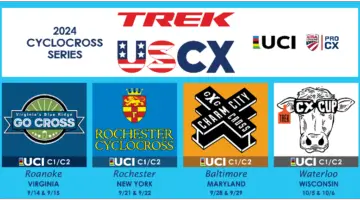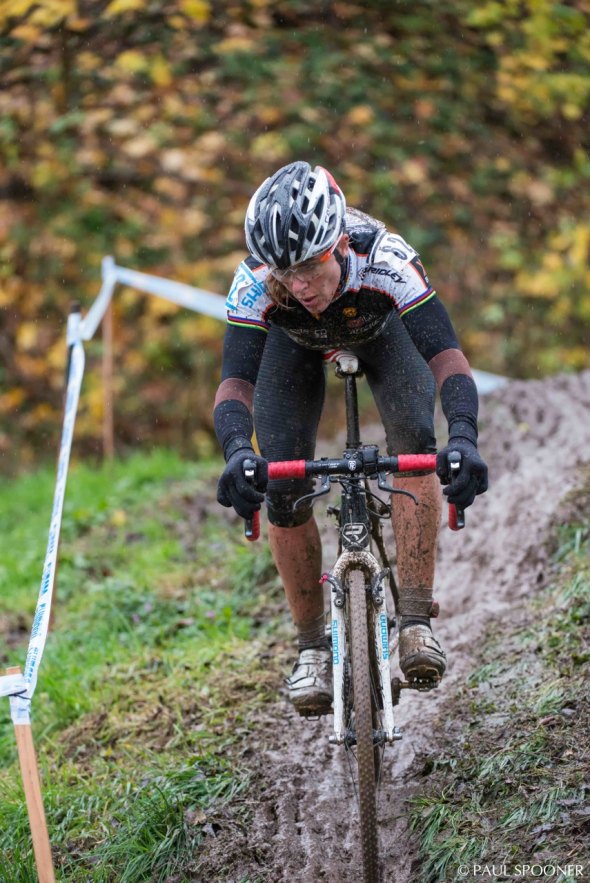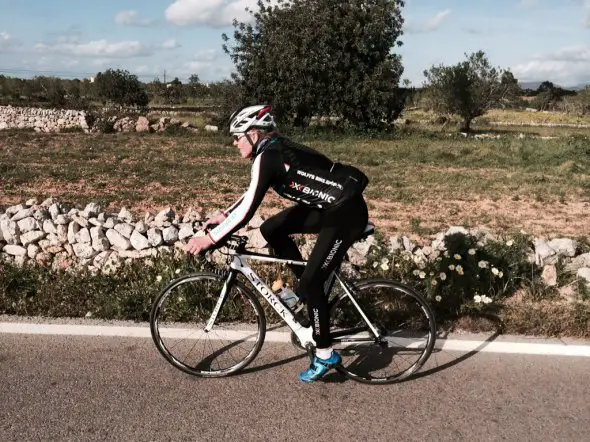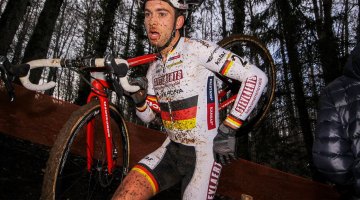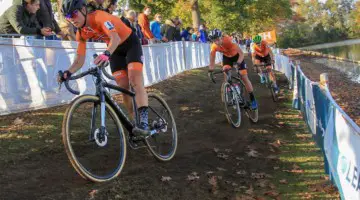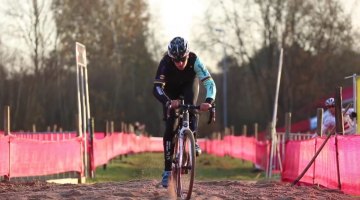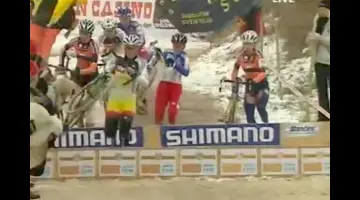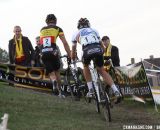by Christopher Langer
Hanka Kupfernagel is a three-time cyclocross World Champion and multiple German Champion in many disciplines. Her endless palmares demonstrates how long and how successful her career has been. Hanka spoke with Christopher Langer from the Crossmasters cyclocross team just before 2014 German Nationals about her present form, highs and lows, favorite venues and women’s professional cycling in general, and then again after World Championships.
CROSSMASTERS: You won again at the German Cup Series race in Vechta, you just arrived from the World Cup in Rome where you managed an 11th place in a mud race despite a bad start row and two mistakes. How is your form?
HANKA KUPFERNAGEL: It’s improving one step at a time. I’m especially happy about that, because after a bad three-week flu in November, I had been struggling for quite some time. I was unsure whether I would be able get back to the top.
CM: Do you have any special training methods to recover from a period of illness?
HK: No… you just start all over again. The hardest part is your head.
CM: And how do you stay motivated when you experience setbacks?
HK: That’s as different as the character of the respective stumbling blocks that fate or whoever else puts in your way. Over the course of many years, I have experienced a variety of situations in which I had to get up again, start over or just fight my way back. Motivation sometimes comes from pure anger and disappointment, or better yet, from your environment (family, friends, sponsors and fans who remain loyal and encourage you).
CM: Do you actually still like riding your bike, in and of itself? Or has it simply become what you do – your calling, so to say?
HK: Good question. It’s a kind of love-hate relationship. Sometimes I cursed the fact that I was caught in the rat race and was forced to subjugate myself to a team, sponsors and my race schedule, live a disciplined life and fulfill the fans’ and public’s expectations. But in the last few years, I have become more relaxed and I can enjoy the possibilities that I have as a professional athlete a lot more. I love taking a long training ride with colleagues (when the weather is good). And I value the fact that my sport allows me to constantly meet new, interesting people and discover new places that I never would have seen. I’m thankful for my health and that I can challenge myself physically when I ride my bike.
CM: Now a more specific cross question: Can you remember your first day on a ’cross bike?
HK: Yes, my first day on a cyclocross bike was in October 1985, soon after I joined the RSV Motor Neustadt bicycle club. When the first snowfall set in, we spent at least two days a week in the woods, and the first thing we were supposed to do was crash practice – at first, we thought the trainer was joking! I started practicing jumping on and off of my bike and learning to ride it off-road back then. I got my first real ’cross bike in 1994. I used to drive from one race to the next with my brother Stefan and got to know the mechanic’s perspective. It was a tough time back then without power washers and assigned boxes… It was a real battle in the depots!
CM: And what was your best ever cyclocross day? The height of your career?
HK: World Championships in St. Wendel 2005 – that was like a good film.… Worlds 2001 in Tabor – I dominated there and I prepared myself on my own for the event… Worlds in Treviso in 2008 – that was surprising and had the best party afterwards! But my highlight? I hope it’s still coming!
CM: I’m sure it will; then let’s hope it gets replaced again and again! Lowest point?
HK: Burnout 2005. 2012 crash at the German Time Trial Nationals. I was fitter than I had been in ages, and because of this technical malfunction I missed my chance at the Olympics! 2012 World Time Trial Championships on the sidelines – that was tough, because my form was still top and, once again, I felt it was ridiculous that after riders like K. Armstrong, Marianne Vos, Olga Zabelinskaja all didn’t start, that they didn’t just fill up the empty spots. So Worlds was held while numerous top-ten riders had to stand by and watch. Those are the old rules that need to be reconsidered.
CM: What course is your favorite?
HK: St. Wendel and Tabor are venues that fit to my style. You need power and technique, and after the run and stairs there is still a hill. These courses also have fast sections.
CM: A course you hate?
HK: When the course isn’t ridable because of rain, and the organizers don’t come up with alternatives so that you are forced to drag around in the mud and the sport’s speed is lost… Then I’m just not motivated! That has nothing to do with cyclocross anymore.
CM: What is your opinion of disc brakes? Up until now you have been riding with cantilevers, right?
HK: I’m very pleased with my TRP brakes. After trying out many combinations in the last few years, I have now found the right combination of brake pads and rims. I’d like to try disc brakes, and I have already received the material from Paul Lange. I just think that I shouldn’t change the set up for all of my bikes for the next three races, since I don’t see an advantage in Nommay and Hoogerheide.
CM: Pat McQuaid has been replaced by Cookson at the UCI. McQuaid once said that minimal wages were not debatable for the women’s peleton, because women’s cycling wasn’t developed enough yet. What should the UCI do to advance women’s cycling?
HK: Europe regulates the equality of salaries for men and women for all careers. You could start there. But unfortunately, it’s not that easy. If we demand the same prize moneys and salaries in women’s cycling, then it wouldn’t take long and there wouldn’t be any races or any teams, because no one could pay for them. So you have to take small steps. A lot has happened. You can make ten times more in women’s cyclocross than on the road. We fought for it long enough. Mike Kluge argued with the UCI in the 2003/2004 season when I won the World Cup overall – and just got a trophy and a handshake (the men got €15,000). Today (unfortunately a bit late for me) the World Cup winner makes €13,000 (the men get €30,000), I think. It’s a big step for us, and it was also influenced by people like Frans Bevers (the Belgian organizer of Zolder and one of my sponsors) who started scheduling the women’s race at 1:00pm, exactly one hour before the men – and then pushing the schedule change through the UCI. He said: “The women can’t start at 10:00 am before the juniors – that’s impossible!” It’s an issue of respect. We need people like him!
I see another big opportunity in the internet, and in the possibilities of gaining an audience on youtube and with livestreams for the sport beyond traditional TV – and then finding completely new sponsors. Women’s road cycling can learn from cross or other sports such as biathlon. Riders and teams need to work together and present ideas to the UCI – and then fight for them. All big events such as World Cups should be organized in parallel, just like Flèche Wallone and Flanders, and TV times should be delegated. Then the rest will come on its own.
CM: After riding for RusVelo for two years you are now transferring to Maxx-Solar. How did that happen? What are your assignments and goals?
HK: After RusVelo’s team directors and management changed, I was optimistic. But then there were difficulties that I shouldn’t comment on because the lawyers are dealing with that now. The bottom line after a disappointing 2013—I would rather work with a small team from my region that keeps its promises and to which I can bring my often long-term personal sponsors—and I want to pass on my experience to young racers. But one dream won’t be fulfilled: As a good time trialist, I would love to fight for the world team title with a strong team. It’s a really beautiful discipline that we already competed in when we were 12 and 13 years old.
CM: Do you have a tip for our readers? Something in the fields of technique, strategy, racing, training, nutrition, etc? Something you think people forget or what has given you an advantage recently?
HK: Three things.
Nutrition. At my events and during training I often see how little people drink. Drinking is important. The old saying and mistaken belief that drinking is a sign of weakness and that you lose weight if you manage 180 km with just one water bottle – that’s real bullshit. No water = no fat gets burned!
Clothing: People save in the wrong place. If you get really good functional clothing, then the purchase price is high, but top brands also last four or five years and often have a repair service or deliver new material in the case of a crash (that negates the high cost). And you also have more fun when your clothing fits well and works!
Technique: Most people have too much air in their tires off-road. Just a few days ago someone proudly told me that he always pumps four or five bar in his MTB tires. Argh! Then you don’t have good grip and you make your life difficult for no reason. Tip: At a cross race, go to the professional racers and check their tires… No one ever rides with more than 1.8 bar!
CM: Thanks for the interview, Hanka, and good luck for nationals on the weekend!
After a Nationals win…
Hanka Kupfernagel went on to win Nationals by a long shot—her seventh national cyclocross title! And then
CM: How did your race go at Worlds?
HK: A day before Worlds, I had a strange feeling, but I guessed it was just nervousness before the race. In the morning, training on the course wasn’t all that great, but that’s not unusual shortly before a race. I wasn’t actually nervous – given my start position (last starter in the third row), I could only hope to get lucky and ride from the back to the front. I was forced to line up on the extreme left, but my plan was to ride into the field on the far right after the starting line straights – I had seen that the faster line was there. If you look at the video of the starting phase, which I really nailed, you can see how I move diagonally through the riders and come out exactly where I had planned. I rode down the hill in 15th or so, but made it through the mud to the first corner in fifth place! That was really cool – I rode the first lap on train tracks and was carried by the gigantic atmosphere along the course… But then I made a mistake, and then another… I felt the power leave my legs like water flows through a sieve. Then came a stomachache that got worse as my power dropped. I have never experienced something like that in my entire career –I lost power so fast!
On Monday night after Worlds I got a fever, cough and headaches… The full deal, for three days. Then it got a little better until a week later it got worse again. Fever. Coughing – so never more that two or three hours of sleep, and I’ve felt a lack of energy since then. A total of 17 days! Things have been better since yesterday. It was the longest and most difficult cold I have ever had as an adult.
CM: What’s next?
HK: I’m flying to Mallorca tomorrow and will be on my bike for the first time since Worlds… slowly! For the first week, never more than one or two hours. I hope the weather gods have mercy on me and make the sun shine!
CM: Your cyclocross goals for next year?
HK: I definitely want to ride cyclocross races again next year. I saw that I’m not far from the top five. If I stay healthy, I can make the podium at major races again. I want to give it my all!
This interview was translated by vehikel-translations.de, a company specializing in German-English translations for the cycling world.











